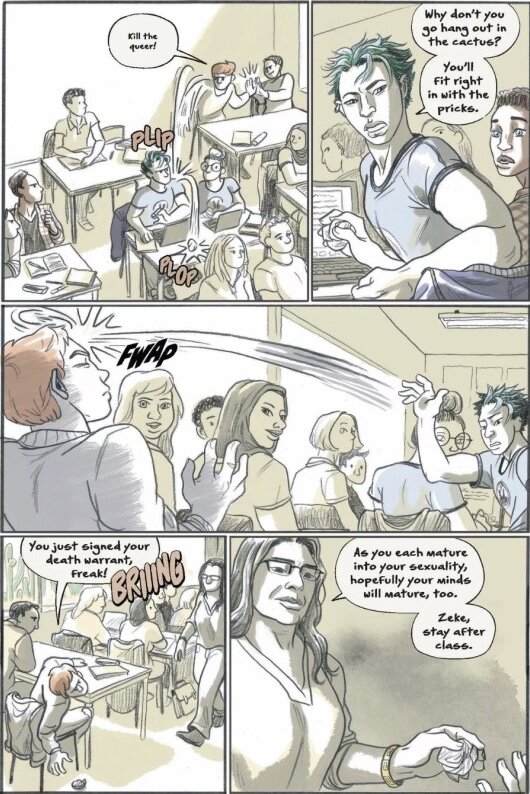You Brought Me the Ocean by Alex Sanchez and Julie Maroh is the coming-of-age tale of Jake Hyde, aka DC Universe superhero Aqualad. Born and raised in the desert city of Truth or Consequences, NM, Jake dreams of leaving to study oceanography and living next to the ocean; however, he struggles with telling his overprotective mom and best friend Maria this. To complicate matters, Jake also struggles with opening up about his sexuality to his mom and Maria, especially after becoming close to the charming, off-beat jock Kenny Liu.
Besides his newfound super powers and college applications, Jake has a lot more to deal with, especially the difficulties caused by the oppressive homophobia in his hometown in all of its permutations. While it’s easy to imagine homophobia as the more explicit and overt forms of rejection and hatred of gay people, it can actually take many forms, some much more subtle than others. One of Jake’s earliest homophobic experiences was being dared to kiss another boy at a birthday party. This more playful kind of homophobia reduces same-sex interactions as a source of entertainment over embarrassment and ridicule. In spite of that, Jake admits that that was the moment he knew that the kiss meant something to him, but since then he never brought it up, even to himself, for fear of ridicule and rejection.
Credit: Alex Sanchez & Julie Maroh
A four-panel page.
First panel: A long shot of Jake’s class, Jake is in the center looking at Kenny slightly to his left. Kenny is focused on their teacher’s lecture.
Jake (narrating): But seeing how kids picked on him kept me from becoming his friend.
Ms. Archer (off-panel): Interesting question, Kenny. It’s documented that Mrs. Roosevelt and journalist Lorena Hickok exchanged passionate love letters, but —
Second panel: A close-up of Jake and Kenny, in the same pose from the previous panel.
Ms. Archer (off-panel): We’ll never know the true extent of Eleanor and Lorena’s relationship. It might have been a deep friendship —
Third panel: While Jake continues to look at Kenny, from the back of the class Zeke is angrily making a paper ball, a dark, smoke-like thought cloud over his head. He is looking menancingly at Jake and Kenny.
Ms. Archer (off-panel): Or who’s to say where Mrs. Roosvelt might’ve been on the spectrum of sexuality? Gender and sexuality are fluid, like water. Love can take many forms.
Fourth panel: A shot of Zeke ready to throw the paper ball, his eyes are narrowed. His friend sits beside him with a grin on his face.
Zeke: Like gay freak forms!
While having to navigate the subtle oppression of societal homophobia, Jake also has to deal with the other end of the spectrum: Zeke, the embodiment of toxic, white male masculinity. Jake has witnessed how Zeke has made it his mission to make Kenny’s life miserable simply because Kenny dares to be different and, in turn, this threatening behavior keeps others like Jake in check. Simply put, queerness threatens Zeke’s worldview, in which men must be straight, violent, reckless, and intolerant. To echo the discussion on the use of color in this graphic novel, the saturation of red in Zeke’s hair stresses his role: he is a concentration of all the negativity Jake associates with his hometown, and he’s as angry, dangerous, and venomous as the animals that sport this color in nature.
A five-panel page.
First panel: From behind the classroom, Zeke throws his paper ball and hits Kenny on the shoulder. He high fives his friend. Jake and Kenny both look angrily back at Zeke.
Zeke: Kill the queer!
Second panel: A close-up of Kenny, angry and annoyed, as he talks back, the paper ball in his hand. Jake is impressed at Kenny’s boldness.
Kenny: Why don’t you go hang out in the cactus? You’ll fit right in with the pricks.
Third panel: Kenny throws the paper ball and hits Zeke on the forehead. The class is looking back, amused.
Fourth panel: Zeke is picking up the paper ball from the floor as Ms. Archer walks up to him. The school bell goes off.
Zeke: You just signed your death warrant, freak!
Fifth panel: A close-up of Mrs. Archer calmly taking the paper ball from Zeke’s hand.
Ms. Archer: As you each mare into your sexuality, hopefully your minds will mature, too. Zeke, stay after class.
Zeke’s explicitly violent attitude towards gay men is an extreme that stems from the compulsory heterosexuality and homophobia demanded from hegemonic American masculinity. A lesser degree of this attitude can be seen in Kenny’s father and his disappointment over Kenny’s gayness disrupting their family lineage. Under this framework, men cannot be gay because how could families, linages and humanity as a whole survive with no reproduction? Additionally, and more importantly, homosexuality poses a real threat to the already-fragile construct of masculinity, which is why homophobia is so rampant in its many forms in order to police deviancy at all levels. As demonstrated by Zeke, deviation from the norm must be punished for the sake of the construct. Homosexuality disrupts the very gender roles and expectations that hegemonic masculinity is built upon because masculinity is constructed in direct opposition to femininity.

